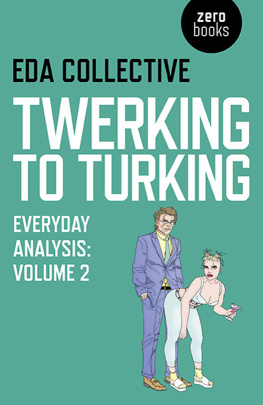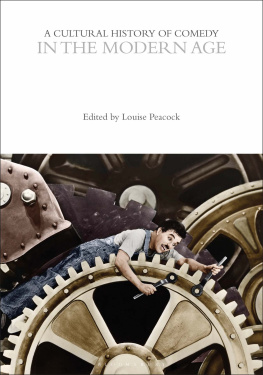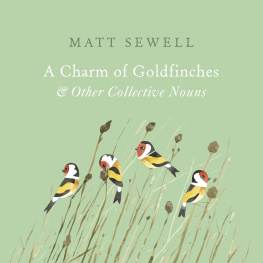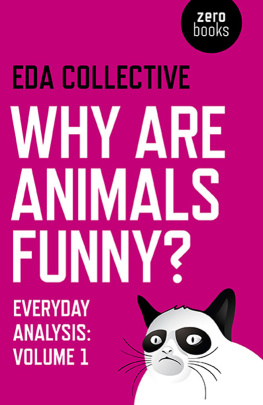Praise for Volume 1
These young thinkers use what they haveintelligence, resourcefulness and an eye for the everydayto produce readings at a pace that the academy cannot mirror. At its best this collection sets a precedent for a new generation of critical engagement with popular culture. EDA is fighting to carve a new space for the intellectual in popular media. Its battle is just beginning.
Matt Foley,Irish Times
Written in clear opposition to a growing academic practice where knowledge control, gate-keeping and intellectual property have become key assets, Why Are Animals Funny? is a serious book that deserves close consideration by those interested in the possible futures of political, social and cultural criticism.
Andreja Zevnik,OpenDemocracy
The EDA Collectives mission is simply stated in the introduction to the book. They want to make us think, and constantly re-think our reality, a reality that is full of impossible complexities. I think these renegades attack this challenge in the best possible way, and that is from the multi-vantage point that only a collective can offer, a panoramic view of different voices, that see different signs, objects, and symbols, and amalgamate them together in a creative register, that makes for a delightful and engaging read.
Zachary Siegel,Critical-Theory.com
The EDA collective comes across as young, intelligent, thoughtful and energetic at a time when the university has become exhausted by the reactionary defence of its own suspicious ideals. Together, the authors have captured the joy of performance, the energy of protest and embedded this spirit within a theoretical framework that is admirably deliberative. It is not often that theory is this fun to read, and less often still that satire is so well versed in the language of its assailants.
Jamie Mackay,Review 31
Like a literary two-way street, this book acts as an accessible inlet for outsiders of the ivory tower that is academia, and a much-needed outlet for those trapped inside (both students and accomplished instructors alike). In brief, it serves to ponder all aspects of cultural minutiae through pickings and choosings of theoretical heavy-hitters like Lacan and Marx, without removing the joy of the sheer insanity and absurdity of it all.
Allison Norris,The Manchester Review
All too many reviewers have said about a book that it will change the way you look at the world and now the phrase is tired and meaningless. In this case, however, the books critical eye affects your real one and does (in a very literal sense) change the way you look at the world.
Ruari Paton,Voix

First published by Zero Books, 2015
Zero Books is an imprint of John Hunt Publishing Ltd., Laurel House, Station Approach,
Alresford, Hants, SO24 9JH, UK
www.johnhuntpublishing.com
www.zero-books.net
For distributor details and how to order please visit the Ordering section on our website.
Text copyright: Alfie Bown and Daniel Bristow 2014
Illustrations editor: James Smith
Cover illustrations: Joseph P. Kelly
ISBN: 978 1 78279 752 4
Library of Congress Control Number: 2014948081
All rights reserved. Except for brief quotations in critical articles or reviews, no part of this book may be reproduced in any manner without prior written permission from the publishers.
The rights of Alfie Bown and Daniel Bristow as authors have been asserted in accordance with the Copyright, Designs and Patents Act 1988.
A CIP catalogue record for this book is available from the British Library.
Design: Stuart Davies
Printed and bound by CPI Group (UK) Ltd, Croydon, CR0 4YY, UK
We operate a distinctive and ethical publishing philosophy in all areas of our business, from our global network of authors to production and worldwide distribution.
0. Introduction
The political landscape, in the so-called West, remains as unarable today as it has been since the hegemony of the supposed centre in parliamentary politicsthat is, the hymnsheet all the mainstream parties sing fromlaid the fields of political possibility, if not to waste, as it may have believed, then fallow, the returning crop of which has been the ravaging lurch to the right (exampled in the election of UKIP in the European elections in the UK). This pestilent weed is one especially adapted to growing in such an arid season. In such times as these we can only pray that analyses of, and investigations into, this situations cultural catalysts and everyday originations can do some work and provide some hope, which is our intention with our second book. In thisour second volume of Everyday Analysis articleswe are covering everything from the dance craze of twerking (a movement in which the glutus maximus is shaken mesmerisingly, popularised on the internet by Miley Cyrus controversial deployment of it in a performance with Robin Thicke) to Turking (the form of work in which an employee is paid a one-off rate for the completion of a task posted online; that is, paid directly their use-value, as opposed to an hourly or minimum wage). We order these articles by theme alphabetically, for ease of navigation, beginning with Advertising and ending with Work and Play, and we are very proud to be able to punctuate them with great illustrations and artwork.
Since the publication of our first book, Why are Animals Funny? Everyday Analysis: Volume 1, we have grown in number of contributors, and thus diversity of theoretical engagement; we have contributed articles to other publications, such as the Guardian; and we have found resonance with audiences ranging from casual surfers online to those of the University (students and teachers alike, and interdisciplinarily), from those established already by publishing outlets (our own followers on our social media and blog, to those of our publisher, the eminent Zer0 Books) to those curious enough to pick a new book up off the shelves which claims to decode the humour of our grumpy feline friendsthe everyday reaches us all, and its analysis, it seems, has sparked the interest of people everywhere.
In the introduction to our first volume we defended vigorously, and we hope rigorously, analysis and critical theory as not only important tools with which to approach and decode our everyday situation (and the operations of ideology, propaganda, and even revolutionary radicality silently, subtly, and often unconsciously at work within it), but also as something intrinsic to our everyday; that is, that lifehowever simple it might feel or unexamined it may remainalways inherently involves processes of interpretation and decipherment, in all of its day-to-day going-about-its-business. In this opening to our new book we will concentrate more on modes of analysis, and try to define what our presiding ones have been, and how they might also move or shift in future realisations.
Write on What You Enjoy! (or, EVERYDAY aNALYSIS)
Probably the most significant criticism that Everyday Analysis has come under in the course of its first year (from January 2013 to 2014), is that it has been too lenient on the problematic in the popular culture that it has tackled (one instance of which concerned our take on Robin Thicke and sexism, from which we received tweets asking why we only focused on the issue of feminism, as opposed to the misogynistic pro-rape structures of society, for example), or even that it has defended such problematic elements of culture, instead of attacking them (such as the attempt to discover a radicalism in controversial rapper A$AP Rockys music and particularly his voice).placed, and herein we will try to negotiate them.










